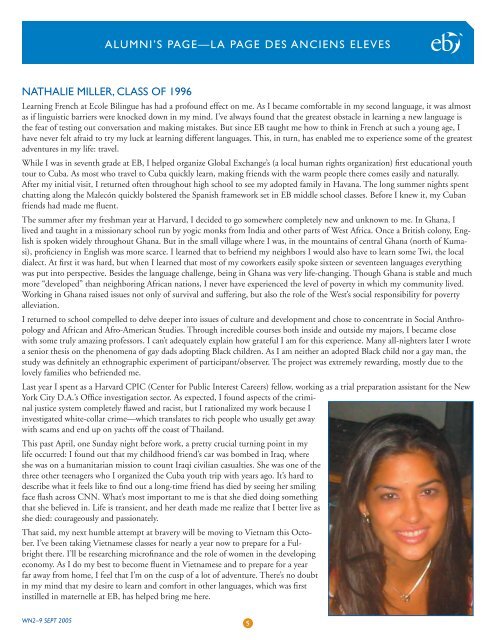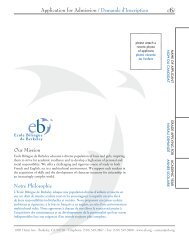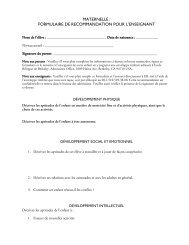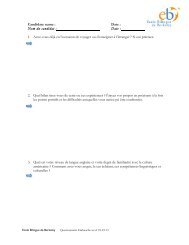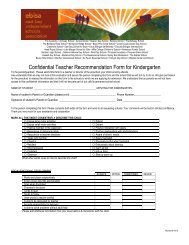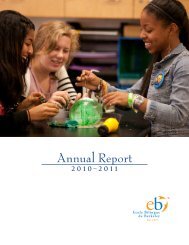Alumni Profiles - Ecole Bilingue de Berkeley
Alumni Profiles - Ecole Bilingue de Berkeley
Alumni Profiles - Ecole Bilingue de Berkeley
Create successful ePaper yourself
Turn your PDF publications into a flip-book with our unique Google optimized e-Paper software.
ALUMNI’S PAGE—LA PAGE DES ANCIENS ELEVES<br />
NATHALIE MILLER, CLASS OF 1996<br />
Learning French at <strong>Ecole</strong> <strong>Bilingue</strong> has had a profound effect on me. As I became comfortable in my second language, it was almost<br />
as if linguistic barriers were knocked down in my mind. I’ve always found that the greatest obstacle in learning a new language is<br />
the fear of testing out conversation and making mistakes. But since EB taught me how to think in French at such a young age, I<br />
have never felt afraid to try my luck at learning different languages. This, in turn, has enabled me to experience some of the greatest<br />
adventures in my life: travel.<br />
While I was in seventh gra<strong>de</strong> at EB, I helped organize Global Exchange’s (a local human rights organization) first educational youth<br />
tour to Cuba. As most who travel to Cuba quickly learn, making friends with the warm people there comes easily and naturally.<br />
After my initial visit, I returned often throughout high school to see my adopted family in Havana. The long summer nights spent<br />
chatting along the Malecón quickly bolstered the Spanish framework set in EB middle school classes. Before I knew it, my Cuban<br />
friends had ma<strong>de</strong> me fluent.<br />
The summer after my freshman year at Harvard, I <strong>de</strong>ci<strong>de</strong>d to go somewhere completely new and unknown to me. In Ghana, I<br />
lived and taught in a missionary school run by yogic monks from India and other parts of West Africa. Once a British colony, English<br />
is spoken wi<strong>de</strong>ly throughout Ghana. But in the small village where I was, in the mountains of central Ghana (north of Kumasi),<br />
proficiency in English was more scarce. I learned that to befriend my neighbors I would also have to learn some Twi, the local<br />
dialect. At first it was hard, but when I learned that most of my coworkers easily spoke sixteen or seventeen languages everything<br />
was put into perspective. Besi<strong>de</strong>s the language challenge, being in Ghana was very life-changing. Though Ghana is stable and much<br />
more “<strong>de</strong>veloped” than neighboring African nations, I never have experienced the level of poverty in which my community lived.<br />
Working in Ghana raised issues not only of survival and suffering, but also the role of the West’s social responsibility for poverty<br />
alleviation.<br />
I returned to school compelled to <strong>de</strong>lve <strong>de</strong>eper into issues of culture and <strong>de</strong>velopment and chose to concentrate in Social Anthropology<br />
and African and Afro-American Studies. Through incredible courses both insi<strong>de</strong> and outsi<strong>de</strong> my majors, I became close<br />
with some truly amazing professors. I can’t a<strong>de</strong>quately explain how grateful I am for this experience. Many all-nighters later I wrote<br />
a senior thesis on the phenomena of gay dads adopting Black children. As I am neither an adopted Black child nor a gay man, the<br />
study was <strong>de</strong>finitely an ethnographic experiment of participant/observer. The project was extremely rewarding, mostly due to the<br />
lovely families who befrien<strong>de</strong>d me.<br />
Last year I spent as a Harvard CPIC (Center for Public Interest Careers) fellow, working as a trial preparation assistant for the New<br />
York City D.A.’s Office investigation sector. As expected, I found aspects of the criminal<br />
justice system completely flawed and racist, but I rationalized my work because I<br />
investigated white-collar crime—which translates to rich people who usually get away<br />
with scams and end up on yachts off the coast of Thailand.<br />
This past April, one Sunday night before work, a pretty crucial turning point in my<br />
life occurred: I found out that my childhood friend’s car was bombed in Iraq, where<br />
she was on a humanitarian mission to count Iraqi civilian casualties. She was one of the<br />
three other teenagers who I organized the Cuba youth trip with years ago. It’s hard to<br />
<strong>de</strong>scribe what it feels like to find out a long-time friend has died by seeing her smiling<br />
face flash across CNN. What’s most important to me is that she died doing something<br />
that she believed in. Life is transient, and her <strong>de</strong>ath ma<strong>de</strong> me realize that I better live as<br />
she died: courageously and passionately.<br />
That said, my next humble attempt at bravery will be moving to Vietnam this October.<br />
I’ve been taking Vietnamese classes for nearly a year now to prepare for a Fulbright<br />
there. I’ll be researching microfinance and the role of women in the <strong>de</strong>veloping<br />
economy. As I do my best to become fluent in Vietnamese and to prepare for a year<br />
far away from home, I feel that I’m on the cusp of a lot of adventure. There’s no doubt<br />
in my mind that my <strong>de</strong>sire to learn and comfort in other languages, which was first<br />
instilled in maternelle at EB, has helped bring me here.<br />
WN2–9 SEPT 2005<br />
5


